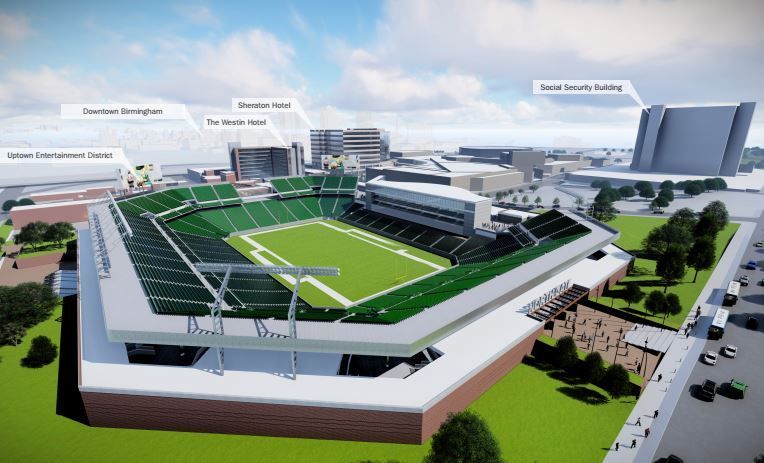Though progress has been made in the effort, several key steps are needed to make a proposed Birmingham stadium a reality, including the passage of state legislation.
Officials have been discussing the prospect of building a new outdoor stadium in Birmingham. With a price tag of $174 million, the facility is being included in the Birmingham-Jefferson Convention Complex‘s 20-year, $300-million master plan. The venue would be designed to accommodate large outdoor events and multiple sports, including soccer and University of Alabama Birmingham football. It is estimated to have a fixed seating capacity of 45,000 that would offer the room to be expanded for larger events.
Earlier this week, the proposed stadium took a step forward when the Birmingham City Council passed a resolution of intent to support the project. The city would be one of the financial partners in the stadium project, contributing $90 million toward its debt service over 30 years, but other steps must be completed to make the proposal a reality. One of those is the approval of state legislation that would enact a three-percent car rental tax in Jefferson County, with the revenues going toward the project’s debt service. Should lawmakers sign off on that plan and other funds are finalized, construction on the stadium could begin before the end of 2018. More from AL.com:
BJCC Executive Director Tad Snider said the next step will be to secure passage of state legislation that would enact a 3 percent car rental tax in Jefferson County. Revenues from this tax will go towards debt service on the BJCC project. The legislation should be introduced in the next two weeks, he said.
The state legislature authorized the tax in 2001 so city officials are hopeful the bill will pass this session.
Construction on a downtown stadium could start before the end of the year if all the promised funding is secured in the coming months, Snider said.
The funding model for the expansion calls for the Birmingham Jefferson Civic Center Authority to chip in $10.7 million in annual debt service, while Jefferson County would pay $1 million annually for 30 years. The city would contribute $3 million annually for 30 years, with the rental car tax projected to result in an additional $3.5 million annually for debt service. In addition, a 10-year taxable private placement through sources such as naming rights, corporate/community support, sponsorships, and UAB would yield $4 million annually for the first 10 years. Officials are hoping to have the new Birmingham stadium completed in 2020.
RELATED STORIES: Proposed Birmingham Stadium Takes a Step Forward; County Commission to Vote on Funding for New Birmingham Stadium; Birmingham Debates Legion Field Upgrades

